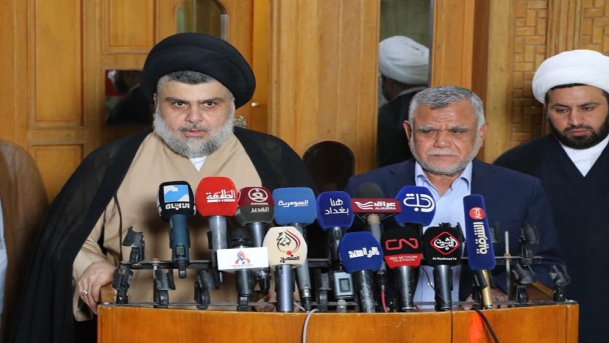
The Iraqi parliamentary elections of 12 May 2018 laid bare the country’s extreme political fragmentation, with multiple political forces and electoral coalitions taking a fraction of the vote, but none enough to easily form a majority government. Yet, the election also saw the rise of non-sectarian, independent politics. More than one coalition, most significantly the Sairun list, ran on a national, development-oriented platform that advocated ending foreign interference in the country, particularly Iranian dominance. While these forces made inroads in the elections, various obstacles are likely to prevent them from making their vision a reality.
Only 44.5 percent of the electorate turned out to vote, the lowest turnout in post-2003 Iraq, reflecting widespread disenchantment with electoral politics and a loss of confidence in the political class. When preliminary results were announced, the Sairun list, led by Muqtada al-Sadr, ended up as the single largest parliamentary bloc with 54 seats, followed closely by the Iranian-supported Fath list with 47 seats; the Victory list, headed by Prime Minister Haidar al-Abadi, came away with 42 seats—a disappointment for Abadi and his US and Saudi backers, who hoped for a big enough win to allow Abadi to retain the premiership.
The announcement of the results sparked objections from all quarters amid accusations of fraud and irregularities in the electronic voting system. The Federal Supreme Court stepped in to order a full manual recount of the votes, to begin on 3 July 2018. The results therefore remain provisional, but most likely only a limited number of ballots in some districts will be discounted, with little impact on the distribution of parliamentary seats.
In the weeks after the election, Muqtada al-Sadr began talks with other coalition leaders to form a new government, reiterating his vision for a non-sectarian government free of Iranian tutelage. But despite some promising initial reports, his efforts came to naught. Then in a surprise move, on 13 June 2018, al-Sadr met with Hadi al-Amiri, the head of the Fath coalition, which he had previously denounced as “shameless militias,” and announced a parliamentary alliance. With this about-face, al-Sadr seems to have abandoned his previous aspirations for a nationalist majority and joined the project to revive the grand Shia coalition.
Al-Sadr’s announcement was undoubtedly a win for Iran. As multiple, not always cohesive electoral alliances jockey for positions, the road to a stable majority government remains rocky, but it is clear that Iran will play a decisive role. The Sairun-Fath alliance was declared just two days after a visit by Qassem al-Suleimani. Meeting with all Shia leaders—including al-Sadr, al-Abadi, al-Amiri, and former Prime Minister Nouri al-Maliki—he reportedly urged them to agree on three candidates for prime minister, to be winnowed down to one in consultation with Sunni and Kurdish political leaders.
The reassertion of Iranian influence has dashed the hope that Iraq was moving away from the post-2003 ethnic- and sectarian-based system to carve out an independent path. In the wake of al-Sadr’s turnaround, Iraqi Sunni Arab leaders met in Amman to discuss their own alliance; though Sunnis have long advocated abandoning sectarian politics, they are nevertheless embracing the same politics to preserve their constituents’ rights.
A grand Shia coalition has implications beyond Iraq. US and Saudi backing for al-Abadi and recent Saudi support for al-Sadr’s program of ending Iranian influence has not paid off. American hopes that the election would weaken Iran in Iraq and even Syria have been frustrated. Despite the factionalism and personal animosities within Iraqi Shia political forces, the election demonstrates that the Shia political class in post-2003 Iraq still sees its strategic depth in Iran; at the very least, they fear Iranian anger. It seems that rebuilding a national Iraqi identity and upholding Iraqi independence cannot be done through elections alone, but will require measures to make foreign interference and sectarian alignment costly and ineffective.
________________________
*This is a summary of a policy brief originally written in Arabic, available here:
http://studies.aljazeera.net/ar/positionestimate/2018/07/180701105109376.html